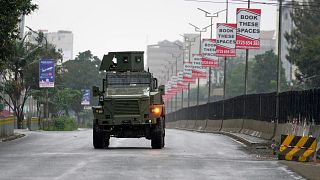Kenya
In Kenya's capital, motorcycle taxis or boda bodas are the easiest and cheapest means to navigate Nairobi's dense traffic.
One startup, Roam Motors, is working to tackle climate change and mobility by curbing air pollution.
The company came up with an effective and cost-friendly way to curb air pollution in Kenya.
The company produces electric motorcycles that run on two rechargeable batteries.
The batteries can be charged at any charging point, each battery can drive for around 90 kilometers, meaning both batteries, when fully charged, can travel for about 180 kilometers.
The batteries take about four hours to fully charge. The bike ranges from $1,550 upwards depending on the client's demands.
Joan Igamba, communications specialist at Roam, says the company noticed the air pollution problem in Nairobi and decided to make electric motorcycles to curb the problem.
She says around 20,000 motorbikes are imported into the country every month, continuing to add to the problem:
"Even though these motorcycles help us navigate the fragmented transportation system here in Kenya, they really do increase the air pollution levels in the city," she says.
"So, with our solution, the Roam Air electric motorcycle, it is a fully electric motorcycle with a removable battery, which can be charged any outlet where you charge your phone."
Manufacturing electric vehicles can be costly, but the company is able to produce the bikes cheaply because it owns the frame.
This gives them the right to use their frame without paying royalties. They do however import other necessary parts and assemble them in Kenya.
Another reason why they're able to produce cheaply is because of tax relief from the Kenyan government to companies that produce locally.
Igamba says their main goal is to ensure thousands of fossil fuel vehicles are taken from the roads, paving the way for electric vehicles:
"How we see the future here at Roam is thousands of electric motorcycles on our roads eliminating fossil fuel driven motorcycles and moving into this new future for the continent and the country," she says.
The first Earthshot Prizes were awarded last year in London just before the UK hosted the COP26 climate conference.
Earthshot offers 1 million pounds ($1.2 million) in prize money to the winners of five separate categories: nature protection, clean air, ocean revival, waste elimination and climate change.
The winners and all 15 finalists also receive help in expanding their projects to meet global demand.
Igamba says winning the prize would be an honor, it would also help the startup expand.
"Winning the Earthshot Prize would really be such a dream come true because we will be able to ramp up production, expand to other markets other than Kenya, and be able to really build on this electric revolution happening in Africa today," she says.












01:01
Kenya: Visa-free travel now available for many African and Caribbean countries
00:22
Boniface Kariuki, a Kenyan mask vendor shot at close range laid to rest
11:17
Bridging the legal gap in Africa’s digital boom {Business Africa}
Go to video
First Malaria treatment for babies approved
Go to video
AI videos falsely show Kenyan President resigning following deadly protests
02:16
Kenya's William Ruto faces growing discontent over economy and police brutality